Subscribe to ‘Words Of Hope’
Get our emails direct to your Inbox with updates about all our campaigns, trips and events.
The Power of Hospitality. The July edition of Amos’ First Of The Month sees the staff team write about hospitality. And food. “We have learnt so much from our partners and friends around the world, but possibly the greatest thing has been the gift and power of hospitality.” Dig in.
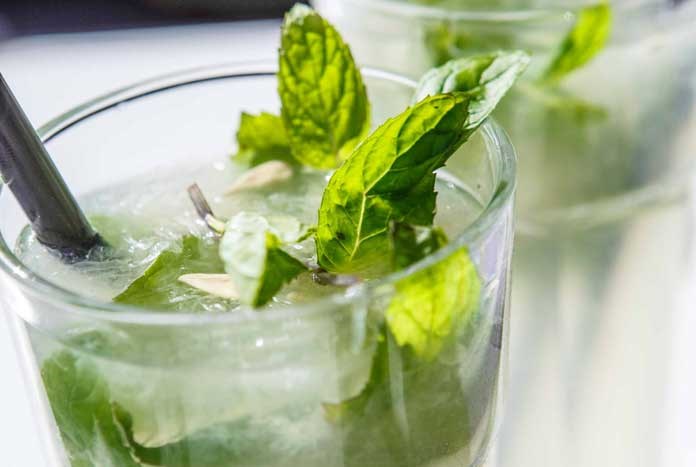
Introduction
Rice and beans in Nicaragua. Dosa and curry in India. Zarb Chicken and Makloubeh in Palestine. And of course, coffee. Coffee everywhere!
For July’s edition of our First Of The Month big read, the whole Amos staff team write about their experiences of sharing some of the best food, and the best hospitality from our partners around the world.
Amos’ Chris Rose writes,
“We often say Nicaragua is the place where we learn, but this is true for each of our partners. But possibly the greatest thing has been the gift and power of hospitality. Time and again I have been amazed by the hospitality I have received in some of the most unlikely situations.”
We hope you enjoy this edition.
Dig in.
— — — — — — — —
The Power of Hospitality
We have learnt so much from our partners and friends around the world. We often say Nicaragua is the place where we learn, but this is true for each of our partners. But possibly the greatest thing has been the gift and power of hospitality.
Time and again we have been amazed by the hospitality we have received in some of the most unlikely situations. It has convinced us that at the heart of the Gospel message which we try, and, largely fail to follow, is hospitality — an undeserved, generous welcome to all, where food plays a very significant part.
This edition of First Of The Month is a collection of those meals and moments which have meant a great deal to the Amos staff team. To choose just one each has proved to be incredibly difficult, as they are all associated with friendship that has been forged around the meal table — Rania and Merai’s amazing cooking in Arroub camp, south of Bethlehem, meant that whenever we took a group to stay in the camp, we ensured that we stayed with them — Bakiyam’s cooking at Karunalaya in Chennai is unbelievable. When the new variant of coronavirus swept through Chennai, she was cooking for 1,000 frontline workers and carers every day as they waited outside government hospitals.
There is an incredible fish place that Mpendulo from Umthombo takes us to in Durban, South Africa, and some of us have eaten so much Gallo Pinto (rice and beans) in Nicaragua (every Nicaraguan will say they are the best beans in the world). Some of the meals on Just Walk to Jerusalem back in 2017 and sandwiches eaten in the rain on the Road Club rides stay long in the mind, as do Maundy Thursday meals at the end of home rebuilds (very different last suppers), Bar-B-Q’s at Wi’am and an Orthodox New Year’s Eve with Elias’ and Said’s families in Bethlehem.
But as anyone who has travelled with us will know, we would be doing ourselves a disservice if we did not talk about coffee — and some of our favourite coffee stops. So go and get yours now — and then read on.
— — — — — — — —
Chris Rose
Palestine, Nicaragua and South Africa
Coffee
If you love coffee it really helps when two of your partners — Nicaragua and Burundi — grow some of the best coffee in the world. If you pack carefully, you can come back laden with 4 or 5 kgs of beans. I have also brought back so much Arabic coffee from Palestine, courtesy of our good friend Marwan, (many of us have also enjoyed some wonderful evenings and great food at his home).
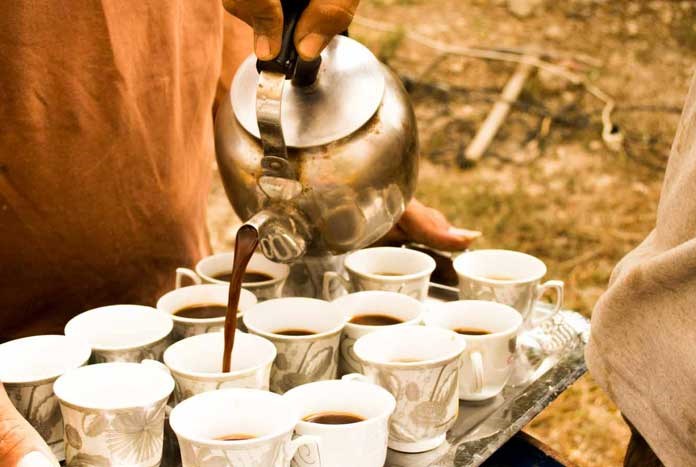
Coffee being poured and shared on a hillside in Palestine
— — — — — — — —
Marwan and I share a love of coffee, and he is the most wonderfully generous person. I would be about to leave for the airport when he would arrive with a kilo of cardamom coffee in a sealed plastic bag. This always meant that I was slightly more circumspect at the airport when asked, “Have you been given anything to bring back?”.
One of my favourite coffee stops in Bethlehem is not Stars ‘n’ Bucks (although it wins in terms of its name), but rather the coffee seller on the road to Hebron. As you head south from Bethlehem, through Beit Jala, you leave Area A (which is Palestinian controlled) and head up a slip road on to Route 70 which is the main settler road where there’s an Israeli military watchtower that marks the start of Area C (Israeli controlled).
I would be about to leave for the airport when he would arrive with a kilo of cardamom coffee in a sealed plastic bag. This always meant that I was slightly more circumspect at the airport when asked, “Have you been given anything to bring back?”.
On the right-hand side of the ramp, there is a coffee seller with a large pot of Arabic coffee which he boils on a camping stove. As we pull over with a busload of 30 visitors, you can see the coffee seller’s absolute delight that he’s about to sell 30 cups worth (a whole day’s takings).
You can also see the bemused looks among the tour group, “Why are we stopping here for coffee?” and the realisation dawning that there could be no better person to buy coffee from as the trickle of orders becomes a flood for his blissfully strong Arabic coffee.
On many trips, the only place you can get good WiFi is in the reception or café of a hotel. While I never stayed in Durban’s smartest hotel — the Elangeni — I have spent countless hours in its café, as it was the only place we could send emails.
“Why are we stopping here for coffee?” and the realisation dawning that there could be no better person to buy coffee from as the trickle of orders becomes a flood for his blissfully strong Arabic coffee.
One morning, I was working away while on a neighbouring table, I saw Eddie Jones, assistant coach of the Springboks rugby team. But my favourite café is in Teustepe in Nicaragua. It is in the beautiful main square of this small, rural town. You sit on a covered veranda, in the shade, enjoying a wonderfully warm day, answering emails and drinking phenomenally good coffee, at just 20p a cup. Oh Happy Day.
— — — — — — — —
Katie Hagley
Nicaragua
Inspiration
Over the years, I have sat down to many meals in Nicaragua — most include rice and beans, great company, warmth and laughter. But there is one meal that I will always remember. It was March of last year, we would be returning home the next morning to a shortage of toilet roll and flour as the Covid-19 pandemic became a reality in the UK, but for now, we were in beautiful, vibrant Grenada, dining out. As a group we had spent the previous 2 weeks together, going from strangers to friends as we shared long, hot days in the rural communities we support in Teustepe and rounding them off with pub quizzes in the evenings.
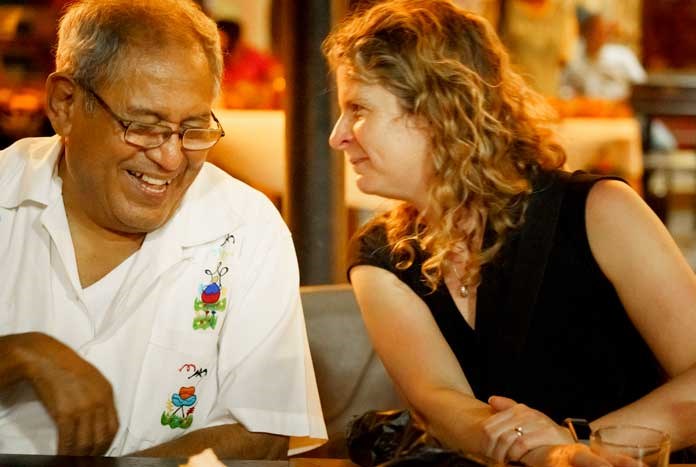
Gilberto Aguirre from CEPAD in Nicaragua and Katie Hagley from Amos Trust
— — — — — — — —
So what was so special about this meal? Well, to be honest, I can’t even remember what I ate in that unremarkable, outdoor, noisy, rainy restaurant. We were sitting in the street with a Quinceañera celebration going on inside the restaurant (a traditional celebration for girls turning 15), with all styles of music blaring from the next restaurant and some street entertainers with a ghetto blaster behind us. We were caught in the middle — not ideal.
It was March of last year, we would be returning home the next morning to a shortage of toilet roll and flour as the Covid-19 pandemic became a reality in the UK, but for now, we were in beautiful, vibrant Grenada, dining out.
However, despite all the noise, the evening was special for two reasons. Firstly, seeing our group relax, celebrate and even dance together after what I knew had been a life-changing trip for many of them. I had that ‘phew, it all worked out!’ moment that all trip leaders will recognise. But it also represented the culmination of all our meals and experiences together over the previous two weeks as we each brought to the table amazing memories of the people we had met and all the stories we had heard — even if we were struggling to hear each other just at that moment.
Most of all though, I will always remember that evening as it was the last time I got to sit down and break bread with my dear friend Gilberto before he died just 3 months later.
Gilberto, or El Profe as he was known, was the former Director of our partner CEPAD, a man I had known for over 20 years — a man whose voice I can still hear saying my name, a man of deep wisdom and humility, with the most fantastic shirts and the best belly laugh. A man who never failed to make me smile and feel valued.
Most of all though, I will always remember that evening as it was the last time I got to sit down and break bread with my dear friend Gilberto before he died just 3 months later.
That night we sat together shouting into each other’s ears; talking and laughing as I told him stories from our time in Nicaragua and as he spoke to me of a recent trip to visit his family in the States with so much happiness. My one regret — not telling him what an inspiration he had been to me over the years, but that one last crazy meal together and a final hug goodbye in a year when hugs have been all too few, means the world to me now.
— — — — — — — —
Karin Joseph
India
Paul and Bakiyam
My first visit to Chennai in India, almost exactly two years ago, was poorly timed for someone unaccustomed to South Indian summers. As I sat waiting for my flight, I checked the weather and saw the daytime temperatures hovering around 44c. When I realised that the heat was going to be that intense, I worried I might lose my appetite; a fairly insignificant concern to some, but to me, it felt like a potentially terrible waste — as I would be spending a week surrounded by some of the most delicious food in the world.
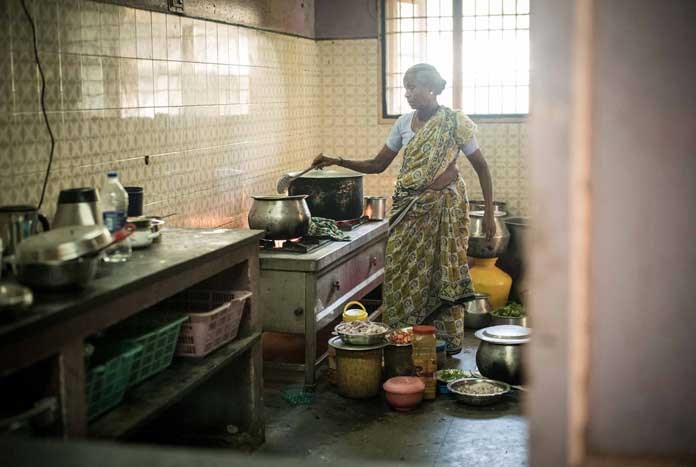
A member of Karunalaya’s team prepares a meal at the children’s centre in Chennai.
— — — — — — — —
I needn’t have worried. I stayed with Paul Sunder Singh, founder and director of Karunalaya, our partner in India, and his wife Bakiyam. They live a few streets away from Karunalaya’s main centre in a neighbourhood of North Chennai. When I arrived at the airport, I was met by Paul and some of the girls from Karunalaya. We stopped soon for a huge breakfast en route back to North Chennai, complete with hot milky chai which we poured between two metal cups to cool it down before drinking it.
It felt as though I never stopped eating from that point onwards. The food in Tamil Nadu introduced me to flavours I’d never tried before, despite having visited India in the past and also living near, and visiting countless Indian restaurants in London. Bakiyam’s cooking was up there with the best foods I’d ever eaten. It was comforting, but ‘comfort food’ doesn’t do it justice; each meal featured multiple dishes which all perfectly complemented each other.
When I realised that the heat was going to be that intense, I worried I might lose my appetite; a fairly insignificant concern to some, but to me, it felt like a potentially terrible waste — as I would be spending a week surrounded by some of the most delicious food in the world.
Every morning we ate idli (small, fat, moon-shaped steamed rice cakes), with spicy chutneys or sambar; or a sweet dosa soaked in coconut milk sprinkled with sugar, which in a strange way reminded me of Rice Krispies. After a morning’s work, we made our way back to the house, for more delicious curries, mountains of rice, chapati and sweet tea. I often had third helpings, despite the punishing heat. Then every evening, more feasts emerged, with new things to try at every meal. Almost all vegetarian, spicy and delicious.
This was a work trip, but it couldn’t have been further from the fairly bleak feel of solo, soulless hotel stays of work trips I’ve taken in the past. I was welcomed into Paul and Bakiyam’s home becoming part of their household for the week. It was of course a culinary delight, but also helped facilitate all the most useful conversations about our work together since the best conversations happen over a meal anyway.
I left thinking if I ate Bakiyam’s food for breakfast, lunch and dinner for the rest of my life, I would be the luckiest person alive (as Paul knows he is)! I also left with four perfect mangoes in my hand luggage — slightly poorly advised (two of them made it home unscathed), to try and bring a bit of the flavour of Tamil Nadu back to London with me.
I often had third helpings, despite the punishing heat. Then every evening, more feasts emerged, with new things to try at every meal. Almost all vegetarian, spicy and delicious.
This year, at the start of the devastating second wave of coronavirus (which as I write is still sweeping through India), Karunalaya turned its attention to providing meals to frontline workers and carers at Chennai’s government hospitals, who had nothing to eat during the crisis.
Bakiyam, with the support of the Karunalaya staff, cooked and served them over 1,000 meals per day for weeks. I know from experience that Bakiyam’s cooking is the perfect nourishment and that her meals would have sustained people through some of their toughest moments.
I look forward to the day when I can be sharing a meal with Paul and Bakiyam, in easier times, once again.
— — — — — — — —
Nive Hall
Palestine
A Giant Radish in ‘The Place of Bees’
One of the best things about Amos Trust’s ongoing home rebuilding programme has been the sheer number of volunteers that have joined us in Palestine to help to rebuild demolished homes alongside our local partners. Success, however, can also be the mother of a challenge, such as “how on earth do I find constructive things for all these people to do today?” Fortunately, if you can mix wonderful local partners with a healthy dose of willingness to do anything, there is usually a way.
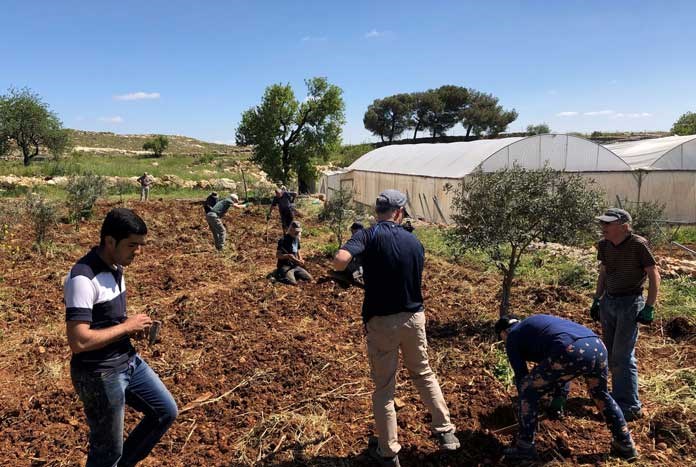
A group from Amos Trust working at a vineyard in Palestine
— — — — — — — —
It’s April 2019 and we are more than 40 volunteers helping to rebuild a demolished home in a small village just outside Bethlehem. I’m packing around 20 people off to the main rebuild site, loading a few more onto a bus to go and help dismantle and relocate a very large greenhouse and then going myself, along with another minibus full of people, to Khalet al Nahla, ‘the Place of Bees’.
You won’t find it on a map. It’s a small patch of family land in Area C of the West Bank, crowded and oppressed by the huge Israeli settlements that run almost continuously along the route of Highway 60, the main road between Jerusalem, Hebron and the south.
Our minibus driver is from Bethlehem and has no idea where he is going and has to rely on frequent phone calls to our friends at HIRN for navigation. I can see him getting nervous as we skirt around the settlements and take him out of his comfort zone, winding our way backwards and forwards down roads of ever-decreasing size. He looks at me with a “are you sure you know what you are doing?” kind of look and I smile back and try to look like I really do.
We eventually join up with our friends from HIRN, who have planned the project, and follow their car to Khalet al Nahla where we meet Mohammed, a farmer and his family. Despite this being our fifth rebuilding project, I don’t think we have yet mastered the art of making a good first impression.
I often imagine the conversations between our local partners and the families and local communities ahead of our arrival, peppered with phrases like “international volunteers” and “previous building projects”, and thus raising a certain level of expectation. Then we stumble off the minibus in all of our rag-tag glory and the smiles of welcome become a little more fixed; eyes furtively looking right through us in the hope of seeing the younger, stronger and fitter volunteers who must surely be about to get off the bus.
He looks at me with a “are you sure you know what you are doing?” kind of look and I smile back and try to look like I really do.
However, we know the steps to this dance by now and as soon as is polite, after completing introductions and, of course, consuming coffee, we set to work to prove our mettle.
The task is on one hand simple and human and on the other deeply political and strategic. We are here for the next three days to help the family plant 96 vines on their land. This will involve digging 96 holes and then filling the 96 holes with concrete as a foundation for 96 steel poles. We’ll then stretch wire between the poles for the vines to grow along. This vineyard will become a ‘fact on the ground’ and will be a counterpoint to a new and unwelcome presence.
On the hill above the vineyard is a new ‘outpost settlement’, which, at the moment, is basically a few hardcore settlers with a caravan who are an off-shoot from the nearby Efrata settlement. The farmer and his family know that their land is under threat — this is how all settlements begin. They need to show every corner of their land is being used despite the difficulties they face. HIRN are on hand to provide the materials for the vineyard and the vines, one of many similar micro-projects they undertake to encourage the incredible resilience we see all around us.
We get digging and the magic begins to happen. There is something profound about working alongside people on the land.
Then we stumble off the minibus in all of our rag-tag glory and the smiles of welcome become a little more fixed; eyes furtively looking right through us in the hope of seeing the younger, stronger and fitter volunteers who must surely be about to get off the bus.
I hear the laughter between the volunteers and the family. The sons and daughters building their confidence, trying out their English and rolling their eyes at our mangled Arabic. Of course, we sit and drink tea. And juice. And coffee. Cakes and snacks start to appear. A car pulls up and a full meal of Makloubeh (consisting of meat, rice, and fried vegetables placed in a pot which is flipped upside down when served, hence the name Makloubeh, which translates literally as “upside-down”), is conjured out of the air. We learn that, like Eskimos and snow, Palestinians have many different words for the stones we are constantly having to dig up depending on their size, shape and depth.
A settler drives down from the outpost and shouts at Mohammed, demanding to know who we are and what we are doing. Mohammed is calm and measured and sends him on his way while I bite my tongue thinking that what I would really like to say to the settler is “what are you doing here?”... or words to that effect.
After lunch, Mohammed beckons me over to join him next to two polytunnels that are set at the corner of one of the three fields that make up the land. He takes me inside and shows me what his land has produced. Everything is ordered and precise and beautifully tended. This is not a friendly place for weeds.
What makes my jaw drop, however, is the size of the vegetables. The lettuce and tomatoes are big but I can’t get over the sheer hugeness of his radishes! I try to explain that everything he grows looks amazing and is much bigger than the vegetables back home but I’m not sure I’m able to get my point across.
A settler drives down from the outpost and shouts at Mohammed, demanding to know who we are and what we are doing. Mohammed is calm and measured and sends him on his way while I bite my tongue thinking that what I would really like to say to the settler is “what are you doing here?”... or words to that effect.
At the end of the day, our minibus returns to pick us up and the driver is visibly shocked to see us getting on clutching a selection of lettuce and tomatoes — and one giant radish.
Sometimes, the very best food and the warmest hospitality is not found in a beautiful restaurant or even gathered around a family table. Sometimes it’s the simplest produce, freshly pulled from the warm soil and shared among new friends.
I can’t wait to go back. I know Mohammed has some grapes he is itching to share with me.
— — — — — — — —
Nick Welsh
Palestine
Merai’s Zarb Chicken
It was in Arroub that I first met Merai — a tall, 20-a-day, deep-voiced man who, unbeknownst to me, was kind of a big cheese around these parts — (rumour has it he was once part of Arafat’s security detail… I can’t confirm this for sure but it wouldn’t have surprised me). Merai was the unofficial mayor of Arroub refugee camp. He’d certainly been around the block a few times and had definitely spent time in jail (as had lots of the men in the refugee camps). He lived with his family at the top of the camp in a house that, oddly, looked a little bit like a ski chalet.
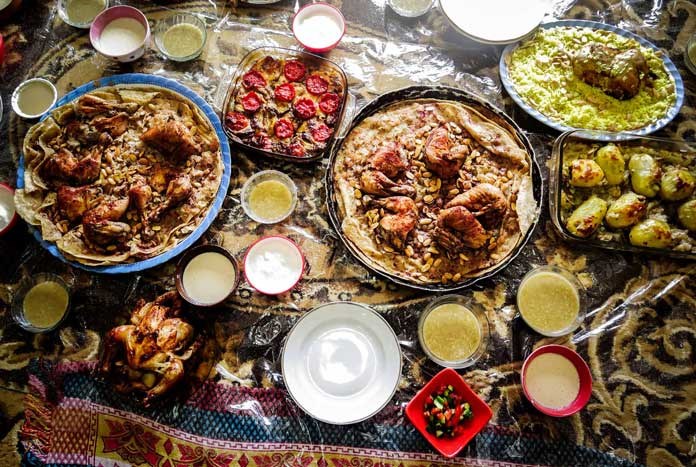
Zarb Chicken with all the trimmings courtesy of our friends in Arroub camp
— — — — — — — —
It was the summer of 2015, when I first accompanied my comrade Nive to Palestine having joined the Amos team the previous autumn. As Head of Communications, my job on this trip was to shoot several films that we would use over the next few years, to help tell stories from the West Bank which in turn would help us promote future trips.
We spent time in Arroub where we met and worked alongside the local community on a number of projects — rebuilding walls, planting gardens and painting murals in the playground of the local U.N. school.
Nive and I were staying with Meria and his family while we were in Arroub. The first time I met Rania, Meria’s wife, I smiled politely and walked towards her open-armed to give her a polite embrace. She looked slightly embarrassed and Meria threw me a look that would have made a Mafia boss proud. Nive had neglected to tell me that men absolutely do not hold out a hand to Muslim women to shake hands, let alone go to hug them. I was mortified. Nive thought it was hilarious.
Early one morning, before we headed out on the day’s activities, I followed Merai into the garden where he was already preparing our evening meal of Spiced Zarb Chicken, a Palestinian/Jordanian dish where the meat is cooked in a wood-fire or clay oven, or in this case, a hole in the ground. It was amazing to watch; he dug a deep hole, built a fire at the bottom, wrapped the chicken in foil, lowered it down and then packed it out with mud. It was total theatre. He said that it would take all day to cook so off we went.
Nive had neglected to tell me that men absolutely do not hold out a hand to Muslim women to shake hands, let alone go to hug them. I was mortified. Nive thought it was hilarious.
That evening we were treated to the most tender, succulent and aromatic chicken I’d ever eaten — served with rice, perfectly cooked vegetables and the most amazing tomatoes I’d ever tasted. From then on, I vowed that any future trips to Palestine would always be based around where we would stop for lunch.
I don’t eat meat anymore but if Merai’s Zarb Chicken was ever put in front of me again, I’d certainly have to think twice about whether vegetarianism really was the best life-choice for me.
— — — — — — — —
Jill Howard-Gunasekera
Palestine
Women, Peace and Pastries
I’m not an adventurous foodie, so when Nick asked us to write about a memorable meal, what came to my mind was the company and the location. So here are the moments, places and people I remember from my Amos trip to Palestine in 2019 as part of a women-only group.
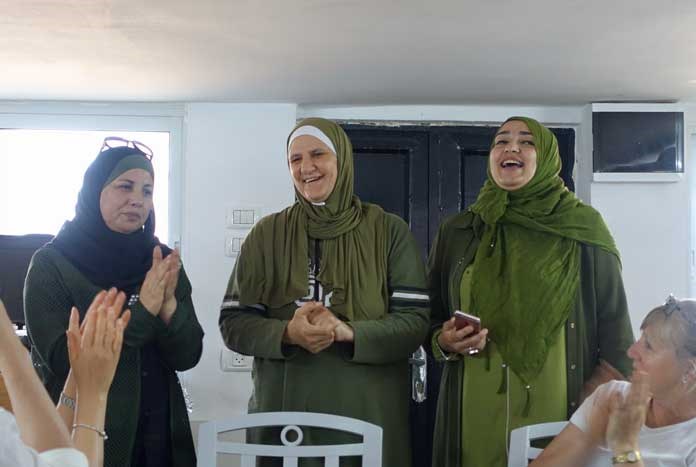
The Women of Al Jabari in Hebron, Palestine
— — — — — — — —
The aim of the trip was always nicely summed up by Jenny, our trip leader, whenever she introduced us — ‘When Amos comes to Palestine, we always hear from wonderful men. This time, we thought we’d like to hear from the wonderful women!’
We are in Nablus, which had been described to us as one of the most Palestinian places in Palestine. It’s one of the biggest cities and is famous for the Palestinian dessert, Kinafah. We are being led by our wonderful host Lucy Taljieh from Wi’am’s Transformation and Reconciliation Centre. We walk through a market past pyramids of spices in golds, oranges, yellows, greens and purples. As we go, the streets get narrower turning into small alleyways, until eventually, we come to a stop under a wonderful sign — ‘Women’s Study Centre — Freedom, Dignity and Equality’. We go in and up some steps which open out onto a beautiful stone courtyard. There are seats for all 19 of us and we are welcomed to sit and are served coffee.
“When Amos comes to Palestine, we always hear from wonderful men. This time, we thought we’d like to hear from the wonderful women!”
Coffee in Palestine is strong and poured out like tea into very small cups, which was great for me as I really enjoy coffee! This moment and place felt special to me, the courtyard, the coffee and the feeling of being able to take time to learn. We listened to Rawdah Albasir, Director of the Women’s Study Centre who had spent 8 years in prison because of her activism as part of the women’s movement.
She talked with us about the education centre for women — about how they try to disrupt the male and female stereotypes within their own culture using research and analysis of the education curriculum in schools; or by challenging the narrow expectations that women’s work is limited to either being a teacher or a nurse.
She explained how they are articulating and sharing their learning about the impacts of grief and bereavement on Palestinian women and how the suffocating effects of the occupation on their fathers, brothers, husbands and sons spills over into their lives. There was a wonderful colouring book that they had created for teaching young girls and boys about stereotypes. Rawdah was inspirational to me and wants to empower women’s leadership within the Palestinian culture and the resistance movement.
My next memorable moment was a beautiful lunch in a very difficult location. Al Jabari is a very vulnerable Palestinian community near Hebron surrounded by settler communities, which in turn are supported by 5 Israeli checkpoints and a road going through the heart of the village that only settlers can use. It was considered a dangerous road due to the speed of the drivers and accidents had happened. A place slowly suffocating. We had come to Al Jabari to have lunch with the women from the Al Jabari Women’s Cooperative Kitchen — with their brilliant slogan, ‘Women, Peace and Pastries!’
Coffee in Palestine is strong and poured out like tea into very small cups, which was great for me as I really enjoy coffee! This moment and place felt special to me, the courtyard, the coffee and the feeling of being able to take time to learn.
Being in such a hard place, it was not straightforward to get to. Our cosy minibus (an in-joke for the women’s trip participants), dropped us off higher up from the village, and we walked down through what felt like people’s back yards. We then reached the main road and crossed over to get to the kitchen. While crossing the road, we attracted the attention of two Israeli soldiers who asked a few members of the group if they were lost. ‘No, we’re fine thanks’ I think was the gist of their reply.
When we arrived we were seated on a lovely outside terrace shaded by orange trees. I think someone commented that an Amos trip will take you to places you’d never get to any other way. What awaited us inside were four inspiring, smiling women, and a feast of rice, chicken and vegetables.
Women’s cooperatives, which Wi’am supports, are groups of women who are coming together to encourage and support each other and create a small group income through offering a service or a product — in this case, making food for different groups. We learned that the lives of many women and girls in Palestine, particularly those in the villages and rural areas, are traditionally bound to the home, following cultural norms that don’t allow them everyday opportunities to gather together. So the cooperatives were providing a social as well as a practical and economic benefit — providing women with their own income and decision making space.
While crossing the road, we attracted the attention of two Israeli soldiers who asked a few members of the group if they were lost. ‘No, we’re fine thanks’ I think was the gist of their reply.
They explained that their cooperative was not only helping them make an income and giving them a good reason to go out of their homes and meet up together, but it was also a way of helping them and the Palestinian community of Al Jabari to stay there. Lucy explained it as the ‘income of steadfastness and resistance’. And that was what the kitchen symbolised for me, their strength to stay.
All of it was memorable — the care taken to welcome and seat us all, the abundance of the food, the warmth of the hosts, the beauty of the terrace and the hard surroundings. I think of it as the Al Jabari Resistance Kitchen.
Everywhere we went we were expected, prepared for and welcomed which is testament to Wi’am’s great relationships, but also testament to what I experienced of the Palestinian culture — a culture of welcome, hospitality and generosity. If we are able to do another women’s trip, try and get on it!
— — — — — — — —
More First Of The Month
Other editions of our First Of The Month essays are available to read and download from here.
Words of Hope E-news
Sign up to receive our regular ‘Words of Hope’ emails and keep up to date with all the latest Amos news and information, including details of our trips and events, news from our partners around the world, and all of our campaigns.
Online reflection
Join us for ‘Words of Hope’ online every Tuesday at 5pm — simply click here to join us a few minutes beforehand.
Amos Trust
7 Bell Yard, London
United Kingdom
WC2A 2JR
Telephone:
+44 (0) 203 725 3493
Email:
[email protected]
Registered Charity No.
1164234

This item has been added to your shopping basket. Please click on the Checkout button below where you can choose your quantity.
Continue shopping Checkout Close